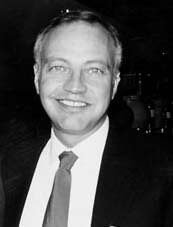NGLTF takes on discriminatory laws; practices lingering one year after sodomy ruling
It’s the law. In Michigan, unmarried people may not have sex or live together, and gays and lesbians cannot marry.
Kansas has a Romeo and Juliet law that provides substantially reduced penalties for statutory rape when both members of the couple are 18 or younger and of the opposite sex—but not when they are gay.
That Kansas statute put Matthew Limon in jail for 17 years in 2000 because, one week after his 18th birthday, he performed consensual oral sex with a 15-year old. He is still in jail, but a heterosexual in the same circumstances would have been released after 15 months. Limon is not set to be freed until he is 35 years old.
Last week, the National Gay and Lesbian Task Force (NGLTF), the New York and Washington, D.C.-based lesbian, gay, bisexual, and transgender (LGBT) advocacy group, announced they are doing something about the problem of discriminatory laws—like the Michigan and Kansas statutes—and the discriminatory enforcement of other laws, like those prohibiting public sex and lewd conduct, which on their face appear evenhanded, but in practice are almost always enforced only against gay men.
The NGLTF’s initiative is the first major effort by a national gay rights organization to address the problems. The NGLTF is first for many of the same reasons that the inequities exist in the first place. They’re about sex, they’re embarrassing to those involved, and they’re embarrassing for many people to talk about. Most of those arrested prefer not to fight the charges, and plead guilty to avoid a public hearing. These statutes and their enforcement feel like something that might have happened in America in the early 1960s, before the Stonewall riots gave gay liberation a name, when police routinely made arrests at gay meeting places, and the arrestees pleaded guilty.
Most national mainstream gay rights organizations have shied away from these problems, because they do not want to have their names, long associated with polite demands for equal rights, domestic partnership statutes, and the right to live like straight people, sullied with the facts of real gay life–which means gay people having gay sex with each other, sometimes in unexpected locations.
NGLTF, in conjunction with the Woodhull Freedom Foundation, is preparing a study that they hope will be ready in time for the NGLTF’s “Creating Change” conference in St. Louis in November. By then they hope to have a catalog and case studies of these laws, in all 50 states. After that they will take on strategies for overturning them.
The initiative will be a multi-year process.
“The first cut will be age of consent laws,” said Matt Foreman, NGLTF’s executive director. The group will study arrests and prosecutions under those laws and then take on public lewdness laws.
“We know that across the country police have used lewdness and indecency statutes to selectively target gay men—and we know that it’s still going on,” Foreman said.
Nearly every city in the country has a spot, or several, where gay men meet to have sex: the Rambles in Central Park, Buena Vista Park in San Francisco, the Fenway a block away from the Red Sox stadium in Boston—and they sometimes find police, often undercover, there to greet them with snug clothes, eager eyes—and handcuffs.
In Sacramento, California, the state capital, one of those places is the 10th Street levee. There, and at four or five other cruising spots, mostly isolated areas along the wooded banks of the Sacramento and American Rivers, police made over 180 arrests for consensual public sex in the year ending July 2003. All of them were of gay men. There, and in a few other major cities in the state’s rural central valley, public defenders and a few private attorneys have started challenging the cases, charging discriminatory enforcement, which is illegal under California law.
The police in Sacramento claimed to have been motivated in their enforcement by public complaints, but when the city’s public defender, a straight white middle-aged woman named Karen Flynn, asked to see documentation of the complaints, the police could not produce a single record: not a dispatch log, nor a phone record, nor a message slip.
Flynn has moved to have all the Sacramento cases dismissed on this basis. The judge still has had the motion under consideration for a month.
In Fresno, down the valley from Sacramento, a lawyer named Bruce Nickerson, who has made a sort of mini-career of these cases, is on the verge of getting a year’s worth of cases dismissed on the same basis.
Nearly all are police stings, with undercover cops posing as gay men. John Duran, a lawyer from Southern California and now the mayor of West Hollywood, has defended more than 1,000 of these cases in his 17-year practice. Duran says that these sorts of cases are certainly discriminatory.
“It’s clear that it’s one of the last bastions of discrimination,” he said, “left over from when police regularly raided gay bars…. It’s the government targeting people who are gay or suspected to be gay…. Without the enticement of the officer, it wouldn’t happen.”
Gay City News has previously reported that in New York City, police arrested 727 people for public lewdness in 2001; 699, or 96 percent, were men. In 2000 and 1999 the ratio was 98 percent men.
The consequences of these arrests can be dire for those who get in trouble. Patrick Califia, who has written extensively on the subject, cites the case of a Plainfield, Connecticut man, Stuart E. Denton, arrested in 2002 in Johnston, Rhode Island. He was the 55-year-old chair of the town Republican committee, an ex-Air Force captain, and the divorced father of one son. The local newspaper published his name and pictures of him and the five other men arrested in a raid on an adult movie theater. Denton killed himself shortly after his arrest.
“In order to get to these men,” Califia said, “the [police] had to pay two admission charges, and it’s not even clear [the accused] were having sex.”
Two of the men pleaded not guilty and ultimately were acquitted. The other three pleaded no contest to disorderly conduct.
“If [Denton] had stuck it out, his case probably would have been dismissed,” Califia said.
“Everyone knows that if the police come across a heterosexual couple making out, the police just ask them to move along,” Foreman told Gay City News for an earlier article. “If it’s a gay couple, they are arrested and in many cases their lives are ruined.… The long-term consequences are devastating.”
Last summer, a series of 2003 cases in East Hampton illustrated the mainstream gay community’s response to the lewdness arrests—denial that they pose a problem. Police arrested five men on June 20, 2003 on East Hampton’s Two Mile Hollow Road, which leads to a beach that has attracted gay men for many years. An ad-hoc group, the “Gay and Lesbian Tax Payers Association of the Hamptons,” posted flyers around East Hampton charging the police with anti-gay motivation.
But the police had contacted the East End Gay Organization (EEGO), the Hamptons’ semi-official gay group, several days before the arrests, warning them of the planned sweep. EEGO’s then co-chair, Tom Kirdahy, didn’t see anything wrong with the plan.
“I don’t believe the police motives were homophobic,” he said at the time.
According to Foreman, however, the arrests were “purely homophobic.”
In California, the Sacramento-based Stonewall Democratic Club echoed EEGO’s nonchalance of EEGO when the arrests happened there. Dan Roth is the president of the year-and-a-half old club and was a staffer for a state assemblymember. In his busy Capitol office, he said that the club and its members don’t want to get too close to the issue.
“We don’t want to be seen as the advocates of public sex,” he said.
Last month, seven straight members of California’s Assembly voted to give marriage rights to same-sex couples. What would they do if they heard gay advocates clamoring for gay marriage—and defending public sex at the same time? Like many gay community leaders, Roth said, “As we take up marriages, as we enter into stable relationships…politically, [this issue is] a problem for the gay rights movement.”
Foreman disagrees.
“Few of the victims of this abuse ever come forward for fear of further embarrassment…The system counts on this silence,” he said. “We intend to shine some light on these shameful practices.”


































